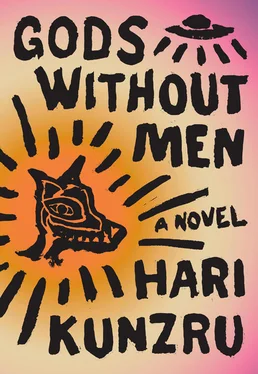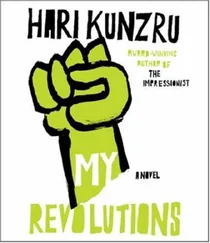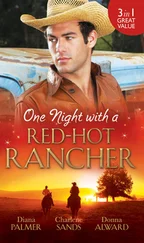As Calhoun and Waghorn pored over maps and planned their route, Deighton lined up to refill his canteen from a big clay olla. When it came to his turn, he drank from the tin dipper and laved a little water over his head. The tracker, Francisco Lobo, was smoking and looking out at the mountains. He was a tiny man, barely five feet tall, with a hooked nose and a smooth round face that made it hard to tell his age. He wore his hair short, with a crumpled pinstripe suit jacket and a straw hat crammed down low over his head, an ensemble that gave him an oddly formal look. Deighton walked over and stood beside him.
“Who do you think it is?”
Lobo looked blank.
“The fugitive. Who is he?”
“Just a man, I guess.”
“I’ve heard of Indian tribes raising up white children, but that was a long time ago. Pioneer days. I don’t understand why he’s got this boy.”
“I ain’t even sure there is a boy.”
Just then Calhoun blew a whistle, shouting at everyone to gather round to get their orders. Some men would ride a handcar to the next station east, where they’d pick up horses and try to cut the fugitive off on the other side of the range. The others were to head for the mountains, trying to pick up the Indian’s tracks. They dispersed to saddle up, then rode out in two lines, each group heading for one of the old mining trails that ran through the mountains. They were barely an hour out from the depot when Lobo held up his hand. The men dismounted and gathered to look at what he’d found. To Deighton it was barely visible, an insignificant oval displacement of sand. Lobo walked on. He found a second print, then a third.
“He was running fast,” the tracker said. “Very fast, heading for the mountains.”
Calhoun shook his head in disbelief. “Look at the length of his stride. It’s what, six, seven feet? That’s incredible.”
Craw was skeptical. “It ain’t real. He’s doing something, disguising his tracks.”
“I don’t see how.”
“I’ve heard of this before,” said Lobo, “but I never saw it for myself. The man’s a true runner. He knows how to run the old way.”
“The old way?”
“Not like ordinary men.”
Lobo shielded his eyes and looked toward the mountains.
“I don’t think we’ll catch him.”
Calhoun was irritated. “I don’t care if he’s an old-running Indian or a young ’un, he can’t keep that pace up forever. Besides, there’s no food up there. He can’t have picked up anything to eat between the Bar-T and here. He’ll be tired and hungry and he’ll slow down. We’ll get him.”
Lobo shook his head. “I don’t know, Sheriff, sir. There’s more to eat in the mountains than you think. And some of the People hide food up there for when they’re hunting. Piñones, jerky. Maybe he knows a place.”
Calhoun didn’t like being contradicted. He spat on the ground, then pulled out a pocket mirror, which he used to signal the second group of riders, some miles to the south. When he saw them change their course, he gave the order to saddle up. They rode on, following the footprints toward the mountain range, making their way across a plain of round rocks scattered with ocotillo and sage. Gradually, the shadows lengthened and the warm evening light softened the landscape, turning the white rocks honey-yellow. By the time the heat had gone out of the air, they were at the foot of the mountains, and hadn’t found any sign of the fugitive for an hour or more. At dusk they were following the only plausible route, a narrow trail up a steep ridge, watching the last orange glow recede from the desert below. As they notched the pass, they saw it led down into a natural shelter formed by two steep walls of rock. Shepherds had built a paddock and a crude stone hut with a horse’s skull nailed over the doorway. The hut was in ruins, and must have last been used many years previously, but there was wood stacked inside and water in an old stone tank. They made camp there. By the time the second posse arrived, they had a fire and coffee on the go. The hobbled horses nosed about for fodder, while the men ate beans and tortillas. Deighton took his plate and sat down next to Lobo. Though no one else was paying much attention, he spoke in a lowered voice, aware that the tracker might not want to speak openly. “Why did you say we’re never going to catch him?”
“Like I said, he’s a true runner.”
“What does that mean?”
“In the old times, there were messengers who could cover two hundred miles in a day. True runners. They knew there’s more than one way to run.”
“I don’t understand.”
“When I was a boy, we lived over on the other side of the river. There was a band of men who ran together. Not to get any place. Just for the joy of running. One of them was a young feller name of John Smith, though he had other names. When he was with his friends he ran ordinary, but on his own he ran another way, the old way, least that’s what people used to say. There’s a story about John Smith, how he and his friends are camped by Paiute Holes and he says good-bye and gets up to go to a camp way upriver, place they call Adobe Hanging Like Tears.
His friends watch him run off, running easy like he always does. They’re curious about how he runs when he’s alone, so they decide to follow him. At first they find his footsteps, long footsteps like we just saw. But they keep getting longer and longer, ten feet, twenty feet, until they just disappear. John Smith’s friends run upriver, following the path. After some days they come to Adobe Hanging Like Tears and they say to the people there, did you see John Smith? And the people say yes, he was here on such and such a day, just as the sun was rising. It was the same morning he left Paiute Holes.”
“So this John Smith was a shaman?”
“No, no, he never carried a stick, never had visions. He was just a man.”
“But he had a magic way of traveling.”
“Not magic. He never used magic. He just knew how to run.”
That was the end of Lobo’s story. As Deighton lay by the fire, his head propped uncomfortably on his saddle, many things seemed to collapse into one: the runner disappearing and reappearing instantaneously at his destination, the wandering Spanish friar, Coyote clinging to the reed and weaving his way into the Land of the Dead. Was this where Garcés had journeyed in his lost days? Was this where the running Indian had led them? He fell asleep listening to the horses shifting about in their hobbles, and dreamed of Eliza, instead of the mud and confusion of the Bois de Belleau. The cold was fierce, and he woke up sometime before sunrise with a stiff neck and a hacking cough that wouldn’t go away, however hard he tried to suppress it.
All that day he was in pain. He felt cold right down to his bones, and the sun was high overhead before he stopped shivering. He was unused to riding. The muscles in his back and legs felt sore, but more serious was the pain in his chest. Something about the motion of the horse seemed to aggravate it, and he began to wonder if Calhoun was right. Maybe he wouldn’t be able to keep up after all.
High in the mountains they came upon an abandoned silver mine. The shaft had caved in, leaving a set of iron rails disappearing into a pile of rocks, like a conjurer’s illusion. By this stoppered mouth a crude stone arrastra stood by a pile of tailings. Someone had camped there the previous night. Amid the ashes of a fire were lizard bones. Lobo knelt down beside them. Calhoun prodded them with the toe of his boot.
“Well, Frankie, that puts paid to your theory that our boy had food up here. Can’t have been much of a meal, that chuckwalla. You ever eat one of them things?”
Lobo said he never did. His people were from the river. Only desert people ate lizards. They followed the mining track until it emerged at the head of an escarpment overlooking a vast empty basin that stretched away at least thirty miles, before the next range rose up to block its way. He’d never been in that country before, and was awed, as he often was in the desert, by the sheer absence of human markers, of any kind of recognizable scale. He didn’t doubt it now. This was the silent space, the land of Garcés’s missing days. The sun was setting, turning the whole expanse red, darkening to a sinister black at the base of its only feature, a cinder cone that rose up out of the flat gravel like a pimple. Calhoun took out a pair of field glasses and spent several long minutes scanning the scene.
Читать дальше












